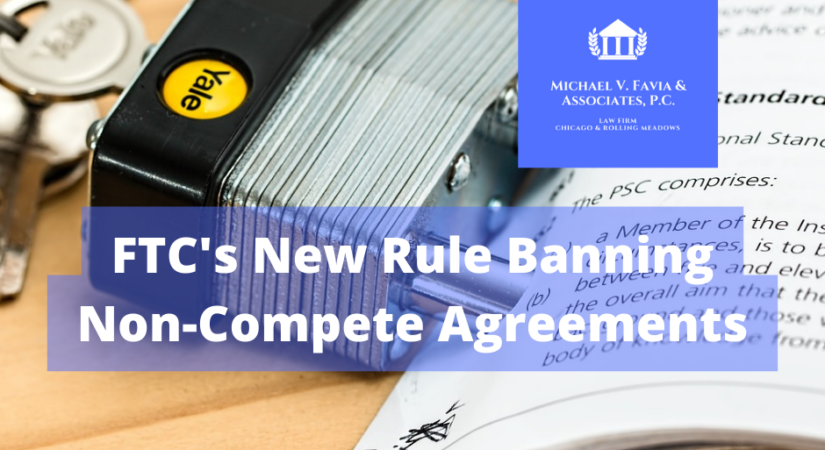How the FTC’s New Rule on Non-Compete Agreements Affects Your Business
On April 23, 2024, the Federal Trade Commission (FTC) issued a landmark final rule prohibiting non-compete agreements for employees at all levels, with limited exceptions. This ruling has significant implications for employers and employees nationwide. Rest assured, Michael V. Favia & Associates, P.C., led by Chicago lawyer Michael V. Favia, with extensive experience in this area, is here to help you understand the nuances of this new regulation and its impact on your business practices. Please read and learn about the FTC’s new rule banning non-compete agreements
What Does the Final Rule Say?
Broad Ban on Non-Compete Clauses
The FTC’s final rule broadly bans all true non-compete clauses. This prohibition extends beyond explicit contractual terms to include any workplace policy, whether oral or written, that functions to prevent a worker from competing post-employment. The rule defines a “non-compete clause” as any term that:
– Prohibits a worker from seeking or accepting work after employment.
– Penalizes a worker for seeking or accepting such work.
– Functions to prevent a worker from operating a business after employment ends.
Elimination of the “Functional Test”
The proposed ‘functional test,’ which determined whether a contractual term was a non-compete based on its effect, has been removed. In simpler terms, any agreement preventing competition is now considered a non-compete, even if it’s not explicitly labeled. This could include overly broad non-disclosure agreements (NDAs), training repayment agreements, and non-solicitation agreements.
Notice Requirement
Employers must notify workers who have entered into non-compete clauses that such provisions are now unenforceable. Notices must be delivered in writing by hand, mail, email, or text message. The FTC provides model language that can be used to communicate this change effectively to your employees.
Who is Affected by the Final Rule?
Applicability to All Workers
The rule applies to all current and former workers, regardless of their position or status. This includes employees, independent contractors, interns, and volunteers working for for-profit entities.
Exceptions for Senior Executives
Non-compete clauses entered into with senior executives before the effective date remain enforceable. Senior executives are those in policy-making positions earning at least $151,164 annually. However, new non-compete clauses for senior executives are prohibited following the rule’s effective date.
Exceptions for Sale of Business
The final rule allows non-compete clauses concerning the bona fide sale of a business entity or a significant ownership interest. Additionally, non-competes related to causes of action accrued before the rule’s effective date are exempt. It’s important to note that these exceptions are narrowly defined and should be carefully considered to ensure compliance.
Implications for Employers
Preparing for Compliance
Employers can review and revise their employment agreements to ensure compliance with the new rule. Here are key steps to take:
– Identify Existing Non-Competes: Conduct an audit of all employment agreements to identify non-compete clauses.
– Notify Affected Employees: Use the model language provided by the FTC to notify current and former employees about the unenforceability of existing non-competes.
– Revise Employment Policies: Update your employment agreements to remove non-compete clauses and consider alternative protective measures.
Alternative Protective Measures
While non-compete clauses will be prohibited, employers can still protect their business interests through other means:
– Non-Disclosure Agreements (NDAs): Ensure NDAs are narrowly tailored to protect trade secrets and confidential information without overbroad restrictions that could be viewed as a de facto non-compete.
– Non-Solicitation Agreements: Draft non-solicitation agreements to prevent employees from soliciting clients or colleagues but ensure they do not function as non-competes.
– Training Repayment Agreements: Structure these agreements carefully to avoid being classified as non-competes.
Potential Legal Challenges
Anticipated Litigation
The FTC’s rule is likely to face significant legal challenges. The U.S. Chamber of Commerce and other groups have already filed lawsuits arguing that the FTC lacks the authority to issue such a rule and that it is unconstitutional. These challenges may delay the rule’s enforcement, creating a period of uncertainty for employers. Employers must stay informed about these legal challenges’ progress and be prepared to adapt their compliance strategies accordingly.
Impact of Court Decisions
Employers must stay informed about the progress of these legal challenges. Court decisions could impact the rule’s enforceability and the timeline for compliance. You can confidently navigate these complexities by staying prepared and consulting with legal advisors, such as those at Michael V. Favia & Associates, P.C.
The FTC’s new rule banning non-compete agreements represents a significant shift in employment law to promote worker mobility and foster competition. While the rule is not yet effective and faces legal challenges, employers should proactively prepare by revising their employment agreements and implementing alternative protective measures.
Michael V. Favia & Associates, P.C., with experience in general practice law in Chicago, Illinois, stands ready to assist businesses in understanding and complying with these new requirements. Contact Michael V. Favia, a distinguished Chicago lawyer, for tailored legal advice to ensure your business remains compliant and well-protected in this evolving legal landscape.
For more information and legal assistance, visit www.FaviaLawFirm.com.

